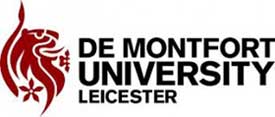Business courses
De Montfort University

- UK
- World Rank : 601
- Visit Website
Learn how to become a specialist who can manage and interpret data from business information technology systems.
Every day organisations accumulate huge volumes of data from a variety of sources for their business systems. These systems vary from customer support, NHS records and critical financial planning, to strategic marketing systems for international retail groups.
We’ll support you in becoming experienced in the use of industry-standard business analytics and business intelligence software SAS, helping you to positively contribute and lead companies in improving their business intelligence.
There is an increasing demand in industry for skilled specialists who can manage and interpret data from business information technology systems. The combination of computing skills and business knowledge taught on this course enables you to enter a diverse range of careers, such as business analyst, analytics consultant, statistical programmer, statistical analyst, SAS programmer, data management analyst and research analyst.
Our computer science and engineering and technology subjects have been scored highly in the Times Higher Education’s 2020 World University Rankings. Out-performing our inaugural ranking in 2019, computer science – which includes subjects such as artificial intelligence, cyber security and information systems – is ranked 24th overall out of UK universities.
Modules such as Information Systems Development will give you a practical, integrated overview of the information systems development process, from project selection and inception, through to capturing user requirements and designing and producing a simple prototype system.
Our Business Intelligence module will also give you the opportunity to understand the business process model of organisations and why key business processes need supporting through effective data capture, conversion and information output.
Key features
English language
If English is not your first language then an IELTS score of 6.0 overall with a minimum of 5.5 in each component (or equivalent) is essential.
English Language tuition, delivered by our British Council accredited Centre for English Language Learning, is available both before and throughout the course if you need it.
| Type of Institution | Public |
| Campus Setting | Urban |
| Endowment | £1.17 million |
| Number of Campuses | 4 faculties |
| Number/Percentage of International Students | 23205 |
| Total number of Professors | 3240 |
| Student Satisfaction Rate | 86% |
| Graduate Job Rate | 97.3% |
| Number of Residence Vacancy | Around 3000 |
| International fee | Undergraduates- £13240 (annual) Postgraduates- £15950 (annual) |
| Number of Academic Programs | UG, PG, Part time, distance, blended |
| Mode of Program | Full time, distance and online |
| Average Graduate Salary | 19800 pounds a year |
| Field of Study | Avg.Fees |
|---|---|
| Art, Design and Humanities: | £13,750 |
| Business and Law | £13,750-£14,550 |
| Media | £13,750 - £14,250 |
| Engineering | £14,250 |
| Computing | £14,250 |
| Health and Life Sciences | £13,250 - £14,250 |
| Nursing BSc | £14,950 |
| Expenses | Estimated cost in pounds |
|---|---|
| Undergraduate tuition fee | 13,250- 14950 |
| Postgraduate tuition fee | 13600-15,900 |
| On campus accommodation | 5,000-6040 |
| Average cost of living | 97-110 per week |
DMU International Scholarship up to 1500 pounds
| Tuition Fees in UK (1st Year Average) | MS: £17276 | MBA: £17276 | BE/Btech: £16632 | BBA: £15130 | BSc: £16632 | MFin: £19000 | MA: £15560 | MIM: £18241 | MEM: £16950 | MArch: £14271 | BHM: £12662 | MIS: £15344 | MEng: £12876 | MBBS: £28865| MPharm: £15452 |
| Average Accomodation & Food Costs in UK | £850 to £1,050 a month |
| Entrance Exams in UK | TOEFL: 88 | IELTS: 6.5 | PTE: 59 | GMAT: 590 |
| Work and Study in UK | Permitted for 20 hours/week with a valid study permit. |
| Post Study Work Permit in UK | 2 Year after graduation depending on the course. |
| Cost of Student Visa in UK | £348 |
| Student Visa in UK | Your nationality, duration of your stay and purpose of your stay are the three essential factors for UK visa. For Non-EU students UK visa is mandatory. |
| Intakes in UK | There are mainly two intakes in UK: January/February & September/October. |
| Top Job Sectors in UK | IT Engineering, Product Design, Mobile Development, Designers, Logistics, etc. |
| Economy in UK | Growth Rate: 1.3% (2018) 1.4% (2019) 1.4% (2020e), 6th Largest Economy in the World by Nominal |
Tuition & fees :
£ 14,750
Hostel & Meals :
£ 6,063
Total
£ 20,813